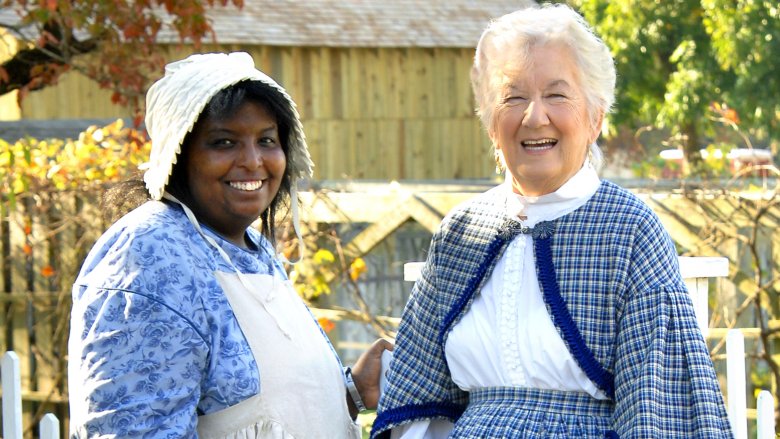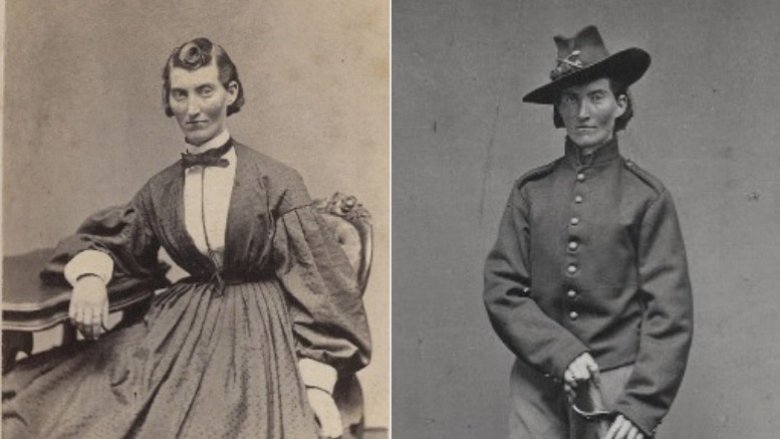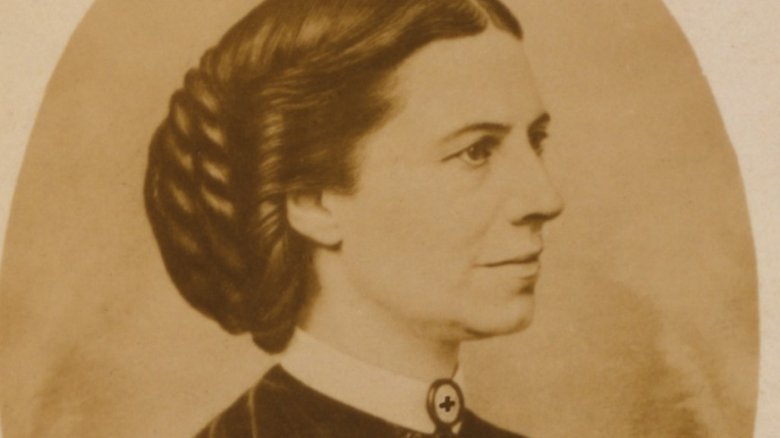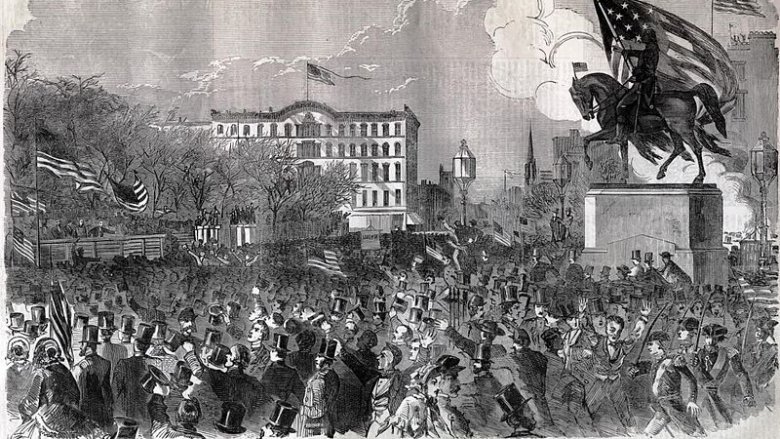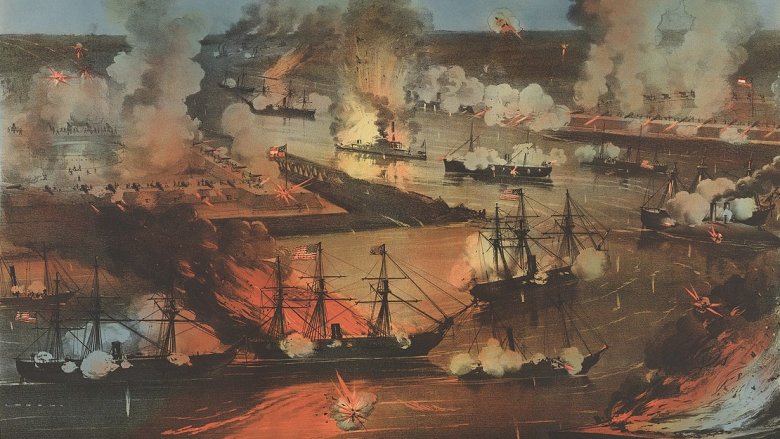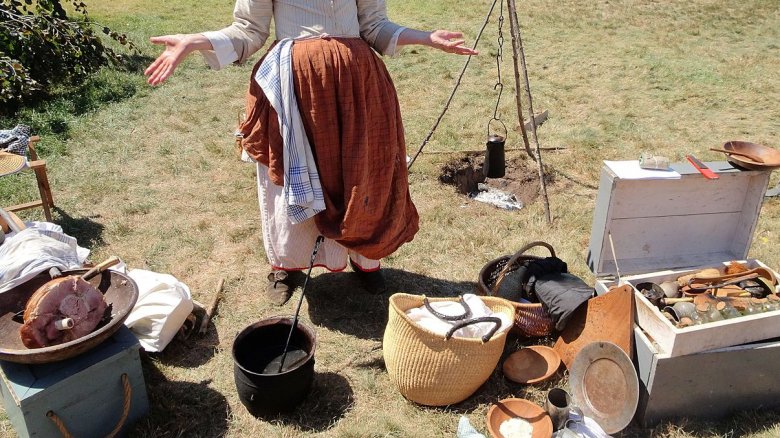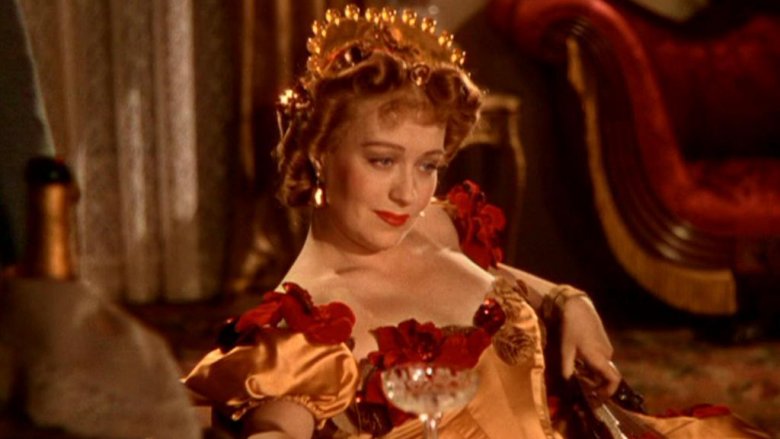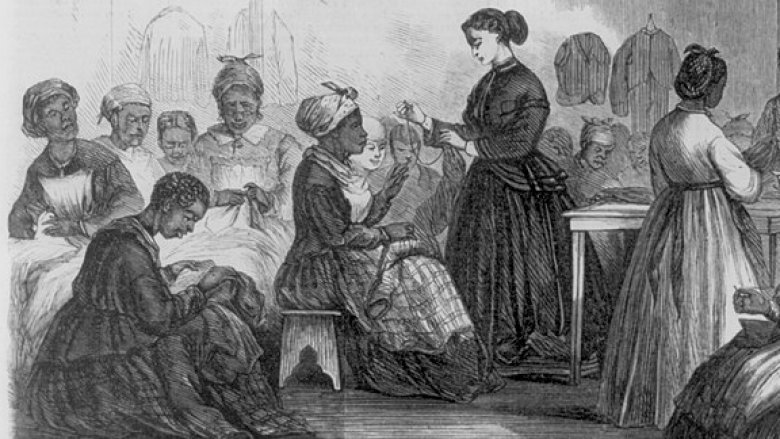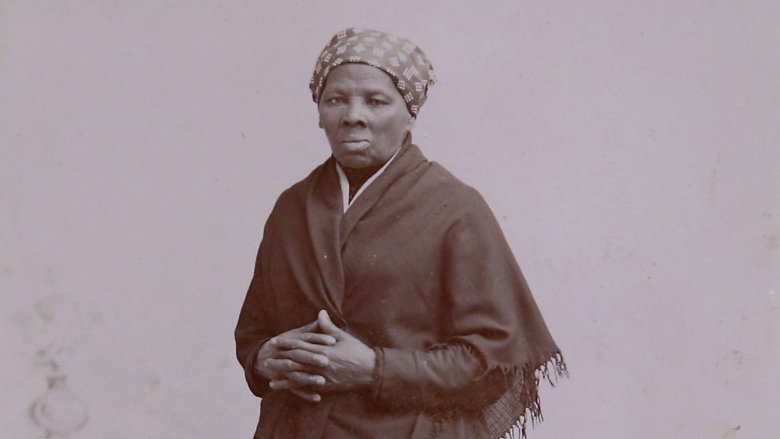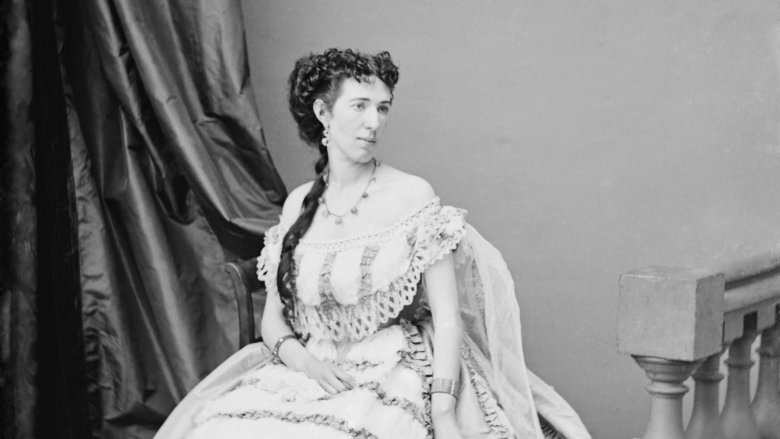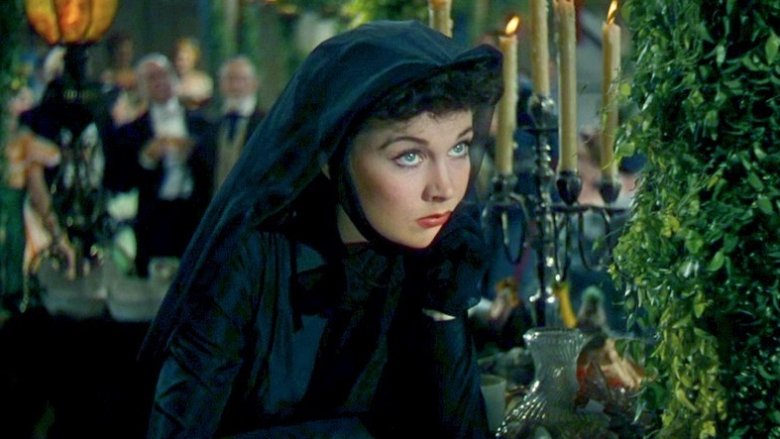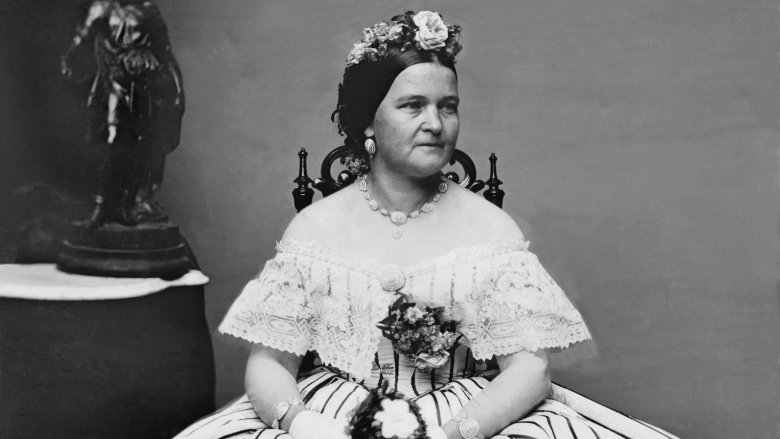What Life Was Really Like For Women During The Civil War
The Civil War wasn't a picnic for men, but women didn't exactly get an easy time of it, either. Any time a war is fought on a country's soil, the home front becomes a battlefield, and all the regular complications are magnified. That's especially true for a war where a country has been ripped in half, and a woman might live on one side but support the other.
In other words, a woman during the American Civil War had it pretty rough. All the men in her life were going off to fight, leaving her to take care of all the things they used to (plus all the stuff she was already in charge of). And then, of course, she constantly had to worry about her relatives and loved ones dying in battle.
But some women went even further with their involvement in the war. They took to fighting, spying, nursing, and following soldiers as they wandered around a divided America, killing each other. The life of a woman during the Civil War was difficult, painful, and full of change, and as a result, history is full of incredible, inspiring, and heartbreaking stories.
Women soldiers fought and died on the front lines
According to PBS, when the disguised Private Ames was found out by her doctor, he demanded to know why she joined the army despite being a woman. She replied, "I wanted to do my part, same as you." She wasn't the only one. Frances Clayton (pictured on the right as "Jack Williams") served alongside her husband. It's estimated anywhere from 400 to 1,000 women joined up secretly (it's obviously impossible to know for sure). They got away with it because the physical exam to join was more concerned with their teeth and ability to hold a musket than their genitals. Young men under 18 signed up, despite that being the official cutoff, so a young-looking "boy" who didn't need to shave yet wouldn't be notable. Women cut their hair, bound their breasts, wore loose clothes, and performed as well as any man. A female soldier fought and/or died in every major battle of the war. Overall, they served with distinction. Women had a 14 percent promotion rate, 4 percent higher than men.
While one female soldier's cover was blown shortly after she was promoted to sergeant because she gave birth, women were most often found out when they needed medical attention. There wasn't much of a to-do when they were. Most were just sent home, while some were briefly imprisoned. In one bizarre instance, a female prison guard disguised as a man found herself in charge of a woman who was in jail for impersonating a male soldier.
Women worked as nurses for the first time
Civil War nurses owed their career to the British Florence Nightingale's work in the Crimean War seven years before, according to PBS. Nightingale helped "lay the foundation for modern nursing concepts and trained nursing care," and she also made the profession acceptable for women, especially in the middle and upper classes. It was the first time in American history that women were allowed to be a significant part of a war effort.
History reports they answered the call by the thousands. The Union had the United States Sanitary Commission and the indefatigable Dorothea Dix, who was appointed superintendent of female nurses of the Union army by the secretary of war. She had very strict rules for her employees, including that they must be "past 30 years of age, healthy, plain almost to repulsion in dress, and devoid of personal attractions." Not sure what that says about Clara Barton (pictured) and Louisa May Alcott, who both signed up. Union nurses were paid 40 cents a day, and they had to work at least three months.
The South was behind in nursing, as in most things, compared to the North. Only four states had formal relief agencies, and there was no national organization for the Confederacy. The women who volunteered didn't receive the same kind of training, but many did incredible jobs, anyway. Phoebe Pember ran the South's largest medical facility, Chimborazo Hospital, while Sally Tompkins paid for a 22-bed hospital with her own money. Plus, she was the only woman officially commissioned in the Confederate army.
On the Northern home front, women found independence
The Northern home front had one major benefit over the South during the Civil War: Most of the battles were fought far away. Sure, there were exceptions, but in general, Northern women left at home didn't have to worry about violence on their doorstep. Instead, they spent their time gathering supplies for the troops and working as activists and nurses. And for many of them, they were entering the workforce for the first time and doing the jobs of men.
According to Essential Civil War Curriculum, the North had huge advantages over the South at the start of the war, namely that the top half of the country actually had factories and other manufacturing and businesses. But then men, especially poorer men who were working in these fields, went to go fight the war. That left women (and sometimes children) to take their places. Washington State University says they took factory and mill jobs, including making the munitions used by the Union army. But more and more men went to fight over the years, and soon, women were needed for other jobs, like working in offices or for the government. By the end of the war, women made up one-third of manufacturing workers, and the US government was the largest employer of women.
In more rural areas of the North, women took over managing their farms when the men left. And they still had to care for children and do regular domestic duties. But the war gave women responsibility and independence they never had before.
The Southern home front was a nightmare for Civil War women
The South was a horrible place to be for women, or anyone, during the Civil War. There were fewer people, fewer supplies, fewer railroads, and a lot of battles close at hand. But white women managed to make it work, mostly.
According to New Georgia Encyclopedia, wealthy women saw a lot of the same opportunities that Northern women had, thanks to the war. They got to take part in the public sphere, voice their opinions about stuff, and do things men used to. Many elite white women had pushed their husbands to support secession in the first place and were very proud of the cause. They would shame pacifist men into joining the army, and single women swore they would only marry men who served. When the guys left, ladies took over the plantations and businesses. They volunteered as nurses and raised funds for the cause. Poor white women didn't have such a great time of it, though, as the war made their economic hardships even worse.
As for the fighting, well, the battles on their doorsteps were bad enough. Then Sherman came. Union general William T. Sherman engaged in "total war" on his march to the sea. Women in his path evacuated by the thousands. Their homes were burned. The men of the Union army "terrorized" white women they came across, which included sexual assault. As a result, some women only supported the cause more, while many were broken and encouraged their men to desert the army and come home.
Camp followers did the dirty work
Armies have needs, and they can't effectively fight if they don't have those needs met. And during the Civil War, domestic duties like cooking and laundry were still a necessity, so women came along to do them. These women were called "camp followers," and the Cape May County Herald says some of these women followed their husbands to war. Rather than stay at home and deal with the difficulties there alone, worrying about if their spouse was dead or alive, these ladies decided to do their patriotic duty and join them. They didn't show up on the official lists of people there, but they did get paid for their work. Ancestry reports a laundress (who the Union army required to be of "good moral character") earned around $40 a month for hand-washing uniforms. In fact, one captain would withhold money from his soldier's paychecks if they didn't settle up with their washer woman, Nancy Summers.
Some of the camp followers were refugees, especially escaped slaves. If you wanted relative safety or couldn't afford to feed yourself, following the army was your best bet. Many women did jobs in exchange for enough food to eat. And these jobs really helped soldiers out on the battlefield. As the Herald puts it, "The deprivation, hunger, disease, violence, and loneliness suffered by the soldiers of this war on both sides was eased somewhat by these women." Having ladies around made life on the front lines easier.
Women during the Civil War sold their bodies to soldiers
When men are away from their wives or families for months, when they're facing death and have access to booze and women offering to do stuff — not just laundry — for money, they are going to bone. Prostitutes were a huge part of the Civil War (as seen in Gone with the Wind), but they probably got left out of your high school history book for some reason.
According to Case Western Reserve University, soldiers sent away for racy literature and pictures. But they could also order condoms. These were sent anonymously in a way that "defied detection," and some even had patriotic symbols on the envelopes.
But it seems lots of men didn't get their hands on condoms, or they didn't work very well, because STDs were rampant. The venereal disease situation was so bad that military leaders thought it "threatened military readiness." The Union alone had 183,000 recorded cases of STDs, and you have to assume there were lots of men who didn't seek medical attention or died before they could. To put that in perspective, that's more than the 110,100 Union troops who died in battle during the war.
Fortunately, the Union army had a solution: official government-sanctioned brothels. Prostitutes in Nashville and Memphis had to be licensed, have regular medical exams, and seek treatment if they got an STD. The rate of venereal disease in soldiers who passed through declined sharply, and a post-war report called the scheme a success that didn't "encourage vice" but just prevented the "worst consequences."
Life was rough for slave women
No matter how bad it is, it's always worse for women. This was even true of slavery. You'd think being enslaved was as bad as it could get, across the board, but the Civil War brought new challenges to the women of the "peculiar institution."
According to Encyclopedia Virginia, once the conflict started, enslaved men would be taken from their homes to build military fortifications, work for Confederate officers, or sent to factories. This left all the backbreaking plantation work to the women. They were expected to do the same work the men had done before. The war also caused the price of slaves to skyrocket, so there was a greater chance they would see their children sold and families broken up. They might also have to leave their friends behind if forced to flee with their masters from the encroaching Union army.
Despite the Emancipation Proclamation, slaves were still enslaved, and the vast majority didn't want to be, for obvious reasons. But men were more likely to escape, which meant the women left behind "suffered the brunt of their mistresses' wrath." Women usually had to wait for very specific circumstances before they could make a break for it. If the Union army came close to their plantation, their chances of escape were much greater. Children and elderly slaves also used close proximity to the Union lines as an opportunity to run to freedom. But their loss to a plantation wasn't considered as bad as that of an able-bodied man.
Free black women kept up their advocacy
At a time when the women's rights movement was in its infancy, and they were generally expected to stay home and be quiet, it was hard enough for any ladies to become activists. It was even harder, of course, if you were a black woman. That didn't stop them, though.
Sojourner Truth was already a famous abolitionist and women's rights advocate by the time the war rolled around. During the conflict, History reports she recruited black soldiers to the Union army. She also worked for the National Freedman's Relief Association, personally encouraging people to donate food and clothes to black refugees fleeing the South. When President Lincoln invited her to the White House, she pulled a Rosa Parks 90 years early and defiantly rode in whites-only streetcars.
Harriet Tubman is, of course, most famous for her incredible actions on the Underground Railroad. She'd been helping slaves escape since 1851 — a dangerous, potentially deadly job where she had many close calls. But according to the Library of Congress, she did even more than that, spying and even working as a cook for the army. She was also a very effective nurse, since she knew lots of folk remedies from her childhood. She spent a whole night searching the woods for the right kind of roots and herbs, and once she found them, she boiled up a bitter drink that saved the lives of many soldiers with dysentery. Saving people in only one way wasn't enough, apparently.
Spying was a dangerous activity for women
Women did plenty of spying during the Civil War. Harriet Tubman was totally badass, recruiting black men to return to the South by posing as slaves to gather information, organizing missions for Union troops to free actual slaves, and even leading an armed expedition herself, which disrupted enemy supply lines and liberated 700 slaves. (She was denied a pension for her spy work, because people suck.) But there were less well-known spies, as well.
Rose Greenhow lived in Washington D.C., but she secretly supported the South. She was a famous society hostess, and when important people would come to her parties, she'd get them chatting, then send any relevant information to General P.G.T. Beauregard. Confederate President Jefferson Davis said her information was the reason the South won the First Battle of Bull Run. Greenhow's devotion killed her in 1864, when she drowned, weighed down by the gold in her pockets meant to fund the Confederates.
Elizabeth Van Lew's family owned slaves, but even as a kid, she wasn't down with that. During the war, she helped Union soldiers escape prison. Once recruited officially as a spy, she ran a whole network with the help of her servant, Mary Bowser. She would gather information and send coded messages to Union officers in invisible ink. She spent her family fortune on her espionage activities and died impoverished.
And then there was Belle Boyd (pictured). Yeah, she was only a teenager, but she still managed to get important information to General Stonewall Jackson and was arrested by Union troops numerous times. So yeah, even though she was on the wrong side, you've got to admire her moxie.
Civil War widows had it hard
The world doesn't stop just because of a war. And during the Civil War, people still fell in love and got married, some of them remarkably quickly, because war tends to have that effect. Of course, if lots of soldiers were married, and lots of soldiers died, that meant lots of women found themselves suddenly widowed. According to Essential Civil War Curriculum, the conflict "created an unprecedented number of young white widows." There were black widows, too, but no one thought to count them. To be fair, no one really knows how many white war widows there were, but based on how many soldiers died and how many were married, the estimate is about 200,000 in four years.
This influx changed society. In any town, especially any Southern town, there would be at least a handful of women wandering around in black. They were supposed to mourn for two and a half years, which meant staying single for at least that long. But a lot weren't interested, and the "flirty widow" (exemplified by Scarlett O'Hara after she loses her first husband in Gone with the Wind) emerged and scandalized society.
A lot of those young widows were also pregnant, or they had young children. And now, there was no way to support them. They also had to get their husband's body home, which was a complicated process. And everyone expected them to treat their husband's memory as sacrosanct. Basically, losing your husband was just the first of a million problems.
Political wives had varied experiences
Being married to a politician during the Civil War meant having unbelievable amounts of indirect power. According to Cokie Roberts, author of Capital Dames: The Civil War and the Women of Washington, 1848-1868, they had access not just to their powerful husbands, but they could also call on other important men and casually give their opinion about things, which could seriously affect policy and decisions.
For example, Varina Davis, first lady of the Confederacy, was only 35 when her husband took office, but she was an invaluable political ally to him. The Ohio State University reports she was never far from her husband's side during the war, in case he wanted to discuss how it was going, which he often did. Varina was consulted on military matters, and when her husband became very ill, she controlled access to him, acting almost as a chief of staff. She was so involved that Jefferson Davis "was heavily criticized for allowing Varina to engage in the political conversations, and in some instances, even help make important decisions."
However, just because a woman was in a position of influence, that doesn't mean everything was sunshine and roses. Mary Todd Lincoln didn't have it easy during the war. The Library of Congress says that time was "marked by a number of conflicts and tragedies" for her. While her husband was commander-in-chief of the Union, Washington society thought she secretly supported the Confederates. It didn't help that half her family was fighting, and dying, for the Southern cause. She also lost her 11-year-old son to typhoid fever in the middle of the conflict, which sent her into a deep depression.
